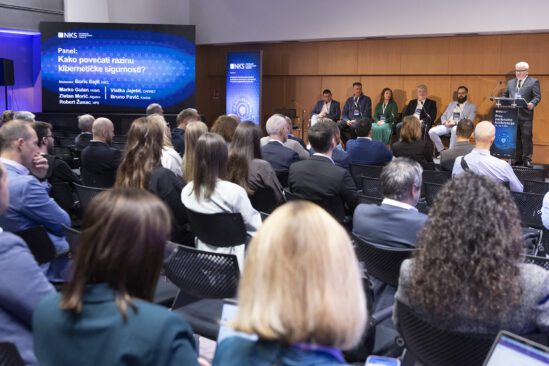Cyber Resilience of Croatia and the European Union: Collaboration and Knowledge Sharing as a Shield Against Future Digital Threats
The First National Conference of the National Coordination Center for Industry, Technology, and Research in Cybersecurity (NCC-HR) demonstrated how cooperation between the private and public sectors, along with knowledge exchange with European partners, can significantly contribute to strengthening Croatia’s cyber resilience. This event laid the foundation for building a more secure digital future, focusing on industrial resilience and protecting digital infrastructure.
Held at the National and University Library in Zagreb, the conference particularly emphasized the importance of continuous investment in the protection of digital infrastructure as a key element of security and development.
“We are truly pleased with the successful conclusion of this conference, which brought together 300 experts from both Croatia and abroad. Over the course of two days, through a rich programme of lectures, panel discussions, and workshops, participants gained valuable insights into the latest trends and challenges in cybersecurity. The exchange of experiences with National Coordination Centres from other countries and the presentation of funding opportunities through EU programmes have provided us with a clearer path toward enhancing Croatia’s cyber resilience, as well as that of the entire European community,” highlighted Vlatka Marčan, Deputy CEO of CARNET for the NCC-HR. She added, “National Coordination Centres collaborate with national bodies to contribute to the promotion and expansion of educational programs, conduct financial support activities for third parties, and, ultimately, provide technical assistance during the project application phase.”
The second day of the First NCC National Conference focused on the practical challenges faced by small and medium-sized enterprises, startups, and new entrepreneurs in the field of cybersecurity. Representatives from the Cybersecurity Task Force of the Croatian Employers’ Association (CEA) presented key aspects of the new legislative framework for cybersecurity. The lecture by Martina Dragičević and Andre Galinović from CEA offered participants an overview of the regulatory framework and ways to implement it across various sectors and types of infrastructure. In addition to legislative details, examples of best practices and implemented measures were provided to help stakeholders adapt to the new requirements. Dr. Dražen Lučić from the Croatian Chamber of Commerce (HGK) spoke about the guidelines for business entities in raising cybersecurity standards and elaborated on the key challenges and needs of major service providers in Croatia, particularly following the adoption of the new Cybersecurity Law. A thought-provoking discussion followed on strategies for improving cybersecurity, with contributions from Vlatka Jajetić of CARNET, Marko Gulan of the Croatian Association of Security Managers, Zlatan Morić from Algebra, and Bruno Pavić from Končar, while Bernard Gršić, State Secretary in the Ministry of Justice, Administration, and Digital Transformation, outlined the key challenges for the public sector.
Other experts who contributed to the conference included Marija Portner Marinković from the Cybersecurity Center of SOA, Krešimir Šipek from the Information Systems Security Bureau, Maja Salapić from the Agency for Mobility and EU Programs, Dr. Tomislav Novosel from the Regional Energy and Climate Agency for Northwestern Croatia, and Dr. Jasmina Obhođaš from the Ruđer Bošković Institute.
A unique feature of this conference was that 30 participants had the opportunity to go through the entire process of drafting and submitting project proposals. This workshop provided information on calls for project proposals, the EU Funding & Tenders Portal, and the application process itself, including application forms, required documentation, and budgeting.
In addition to the ongoing activities in Croatia’s digital transformation, cooperation between EU member states is crucial to ensuring improved resilience to cyber incidents and a secure cyberspace for Croatian citizens. The First National Conference of the National Coordination Center for Industry, Technology, and Research in Cybersecurity has laid a strong foundation for future efforts in strengthening Croatia’s cybersecurity. Through collaboration among various stakeholders, knowledge exchange, and practical solutions, the conference highlighted the importance of aligning with European initiatives and legislative frameworks.



